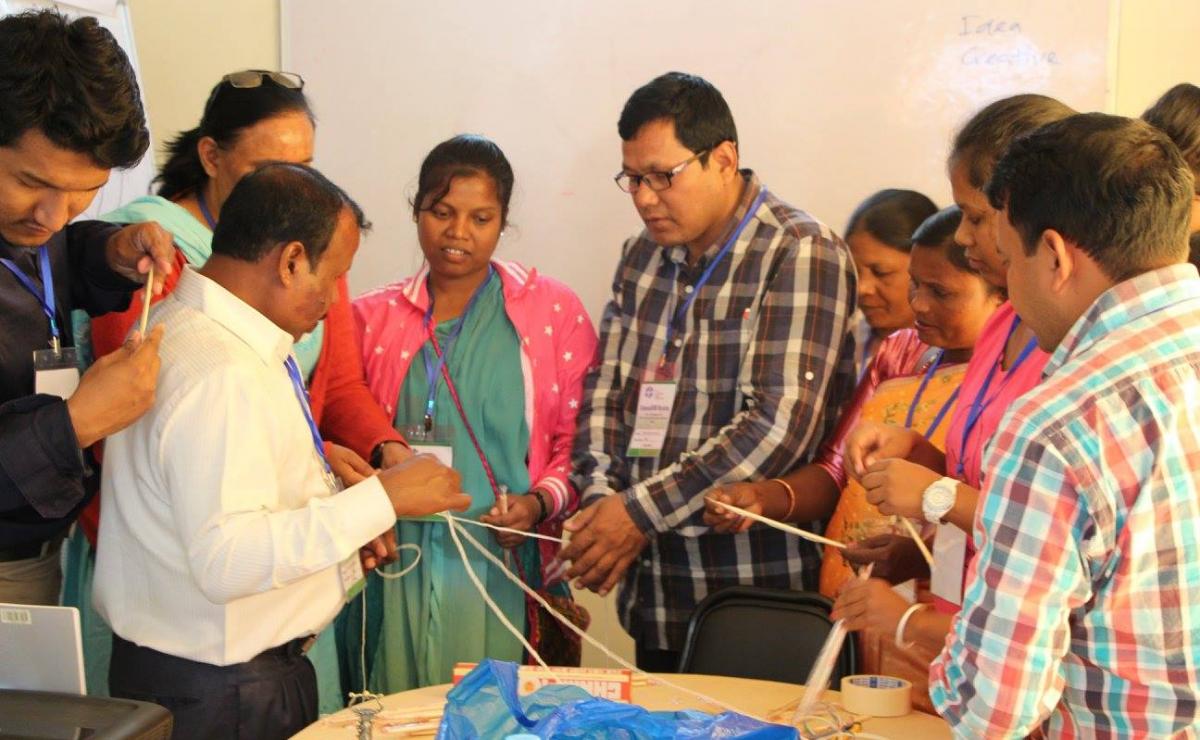Increased Participation of Women and Youth Needed to make Diakonia Innovative

More participation of women and youth need to take part in Diakonia to make it more innovative, said participants of the LWF Department of Mission and Development (DMD) workshop on Diakonia and human resource management held in Kathmandu, Nepal, 1 – 5 November.
The LWF/HICD program evaluation conducted in 2015 indicated among many other outcomes that 737 candidates were trained as Diakonia/development professionals (from diploma, bachelor & master to doctoral levels) during 2005 – 2014. It was much heartening to note that 42% of these well-trained persons are women, and close to 60% are youth. Surveys and case studies conducted in some 33 member churches in 9 countries around the world confirmed that “…Women and youth have gained new insights for participating and being agents of change.”
Upon sharing this information at the Diakonia/HRM workshop in Nepal, many participants expressed that these immense capacities and professional insights, more particularly of women and youth, ought to be better recognised and utilised at different levels across the Communion.
LWF churches need to address poverty cycle
“I understand that LWF is not only committed to training us but also to develop our capacity in terms of competency and skills,” said Rev. Joseph Soren, President of Nepal Evangelical Lutheran Church.
Dr Prabin Manandhar, LWF World Service Country Director for Nepal noted that there is an urgency to address the vicious cycle between poverty and vulnerability and that member churches are being equipped to strategically intervene and address these issues at the grass-root level.
A total of 23 participants representing church leadership, Diakonia/development professionals, youth and women leaders and volunteers participated in a four-day workshop to enhance insights and skills toward improving organisational stability, peace building, succession planning and human resources management in the member churches and related Diakonia projects, programs and institutions.
Abebe Yohannes Saketa, DMD Program Coordinator, oriented the workshop participants on the current thematic focus of the LWF Human and Institutional Capacity Development program, sharing insights and learning from the recent program evaluations and highlighting procedures/requirements of the revised HICD Guidelines.
“This workshop is taking place at important junctures in the life of the Lutheran Communion: member churches are preparing to celebrate the 500th anniversary of the Reformation; looking forward to participate in the LWF Twelfth Assembly due to take place in Windhoek, Namibia during 10-16 May 2017” Saketa said.
Saketa highlighted the joint commemoration of the Lutheran World Federation and the Catholic Church which was held in Lund, Sweden, on 31 October under the theme, “From Conflict to Communion – Together in Hope”.
Ms Eva Kisku, the LWF Council Member from the Bangladesh Northern Evangelical Lutheran Church, offered prayers, praising the Lord for the grand occasion.
“Innovative ideas of the younger generation are needed to develop the use of church property to ensure financial self-reliance - Prince Barman
Reflecting on conflict mitigation
Karan Besra, a youth participant from Nepal Evangelical Lutheran Church (NELC) said “effective communication skills are essential to defuse potential conflicts,” Besra realised this as he reflects on his own context during the workshop.
Rinki Rachel Soren from Nepal said, “I have seen how misunderstanding has caused conflicts that led to splits,”. Munjulika Soren, a well-respected women leader from Bangladesh Northern Evangelical Lutheran Church who engages in the peace building process within the Santal community said, “I am grateful that I've learned conflict transformation models from Scripture, this is important for me as a woman leader, I'm going to use these models during the peace-building processes.”
Participants were introduced to three biblical peace-building models or processes by Rev. Steven Lawrence LWF/DMD/Asia Desk. Church leaders agreed that women’s participation in peace-building processes is vital and that their contribution cannot be marginalised or belittled.
Youth from the three participating churches were unison in voicing their concern that greater transparency is needed when it comes to conflict transformation and peace-building processes so that the younger generation can be equally responsible for addressing conflicts within the church.
Exploring innovative approaches to Diakonia
“Innovative ideas of the younger generation are needed to develop the use of church property to ensure financial self-reliance,” said Prince Barman from Bangladesh Lutheran Church.
He also believes that ongoing collaboration and cooperation among youth and church leadership is key when it comes to serving one's neighbour.
Susheela Murmu from Nepal Evangelical Lutheran Church, who is serving as cooperative manager, managing 300 beneficiaries said, “I am taking it as a challenge to think and introduce innovative ways to cooperative members who are finding it difficult to pay their loan.”
This would ease their burden and speed-up the process of recollecting the loans so that it could be of benefit to other needy women and their families.
Geok Seong Wah, the workshop facilitator from Lutheran Church in Singapore who introduced Innovative Diakonia to participants, said: “It is important to ask the right questions when it comes to innovation.”
LWF Diakonia and human resource management workshop was hosted by the Nepal Evangelical Lutheran Church and co-hosted by LWF World Service Nepal.
Lutheran mission work in Nepal began in 1936 through a layman, Phagu Murmu, from Northern Evangelical Lutheran Church, Dumka, India, and the Nepal Evangelical Lutheran Church was established on July 18, 1943. It has more than 1,200 baptised members worshipping in 12 congregations and three home groups. Nepal Evangelical Lutheran Church joined the LWF in 2010 and is a thriving and active church in Nepal.

